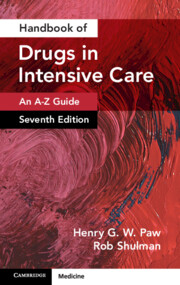Book contents
- Handbook of Drugs in Intensive Care
- Handbook of Drugs in Intensive Care
- Copyright page
- Dedication
- Contents
- Introduction
- How to Use This Book
- Common Abbreviations
- Acknowledgements
- Drugs: An A–Z Guide
- Chapter A
- Chapter B
- Chapter C
- Chapter D
- Chapter E
- Chapter F
- Chapter G
- Chapter H
- Chapter I
- Chapter K
- Chapter L
- Chapter M
- Chapter N
- Chapter O
- Chapter P
- Chapter Q
- Chapter R
- Chapter S
- Chapter T
- Chapter V
- Chapter Z
- Short Notes
- Appendices
- Drug Index
Chapter B
from Drugs: An A–Z Guide
- Handbook of Drugs in Intensive Care
- Handbook of Drugs in Intensive Care
- Copyright page
- Dedication
- Contents
- Introduction
- How to Use This Book
- Common Abbreviations
- Acknowledgements
- Drugs: An A–Z Guide
- Chapter A
- Chapter B
- Chapter C
- Chapter D
- Chapter E
- Chapter F
- Chapter G
- Chapter H
- Chapter I
- Chapter K
- Chapter L
- Chapter M
- Chapter N
- Chapter O
- Chapter P
- Chapter Q
- Chapter R
- Chapter S
- Chapter T
- Chapter V
- Chapter Z
- Short Notes
- Appendices
- Drug Index
Summary
Benzylpenicillin can only be given parenterally. It is active against most streptococci but the majority of strains of Staphylococcus aureus are resistant due to penicillinase production. Resistance rates are increasing in Streptococcus pneumoniae, and benzylpenicillin should probably not be used for empiric treatment of meningitis unless local levels of resistance are extremely low. All strains of Neisseria meningitidis remain sensitive.
- Type
- Chapter
- Information
- Handbook of Drugs in Intensive CareAn A-Z Guide, pp. 44 - 50Publisher: Cambridge University PressPrint publication year: 2025

